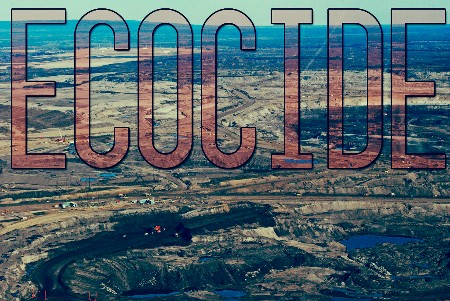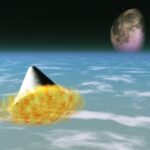Environmentalists are ratcheting up a campaign to have ecocide recognized and prosecutable by the International Criminal Court. The term has entered the lexicon of words associated with the environment in the last few decades as global warming, deforestation, and ocean and freshwater pollution have continued despite efforts by the international community to rein in the behaviours causing these phenomena.
We know what genocide is, but do we understand ecocide?
By definition, the term refers to the destruction of the natural environment by deliberate or negligent human action. Back in 2010, The Guardian published an article listing the top ten “ecocides” on the planet, using the previously seldom-used term. That list included:
- The Alberta oil sands defined as the most damaging project on the planet at the time producing more emissions in that year than Austria, Portugal, Ireland, and Denmark combined. Since 2010 the oil sands have gotten bigger threatening the Athabasca River watershed and communities downstream from them.
- The North Pacific gyre had been recently discovered in 2010 with an estimated 100 million tons of garbage, a toxic mess for aquatic wildlife just floating in the water column going tens of meters in depth. Since that date, the gyre has not dissipated, and if anything the mid-Pacific garbage dump is increasing in size. But the gyre is just a small part of the plastic pollution problem. A Scripps Institute study reported that 9% of Pacific Ocean fish had plastic content in their stomachs and that plastic pollutants were contributing to the death of hundreds of thousands of birds, fish, turtles, and sea mammals annually.
- The Niger delta where oil companies have operated with impunity and no environmental supervision for decades has contributed to oil spills from corroded pipelines adding to millions of barrels that get siphoned off or spilled into the region since 2008. The detritus of oil is everywhere in the delta.
- The Niyamgiri Vedanta Resources Bauxite Mine in India threatens an entire tribe with extinction along with the forests and wildlife of the region where they live. In 2021 you can substitute the Vedanta mining operations with ones like the Bingham Canyon copper mine in Utah, the Berkeley Pit mining operation in Montana, or the Grasberg Mine, in Indonesia, all of them environmental nightmares.
- The Guardian listed West Virginia Mountaintop Removal to mine the coal that lies beneath. But the truth is this type of mining practice had become commonplace throughout much of Appalachia in the latter half of the 20th century. The practice of blasting the tops of mountains in Kentucky, West Virginia, Virginia, and Tennessee became common practice. Even worse, the disposal of overburden was dumped into nearby valleys blocking streams and rivers and polluting groundwater. Finally in January of 2011, the United States’ Environmental Protection Agency vetoed a mountaintop removal permit for a site in West Virginia citing concerns about the environmental impacts on water quality and aquatic life during operation and after reclamation.
- The Guardian singled out the city of Linfen, China, as the most polluted on Earth in its ecocide list. But Linfen was and is representative of many of China’s cities where coal-fired power plants still dominate the energy mix and levels of particulate matter in the air are shortening Chinese lifespans by as much as five years. If that is not ecocide, what is? Back in 2013, I posted can China survive its “airpocalypse.” This question remains unanswered despite China’s commitment to net-zero by 2060.
- The Guardian singled out a Texaco toxic dump in the Amazon jungle in its top ten ecocide incidents. Chevron acquired Texaco and this headache in the Amazonian jungle of Ecuador. The company, however, has done little to remedy the situation. In fact, in 2020 in the same area, Ecuador experienced the largest oil spill in the last fifteen years. This time it wasn’t Chevron, but another oil company operating without any environmental constraints.
- Deforestation of the Amazon Basin was number eight on the list in 2010 but certainly has moved up several orders of magnitude under the presidency of Jair Bolsonaro in Brazil. The wholesale cutting of mature rainforest trees is turning the Amazon Basin into an arid wasteland arid disrupting global weather patterns thousands of kilometers away including causing water shortages as far away as Africa and South Asia. The more we cut the higher degree of likelihood that our behaviour will lead to a global freshwater crisis.
- Space junk refers to the orbital debris left by spacefaring countries. In 2010 the approximate number was 12,000 orbiting the planet. In 2021 that number has almost doubled. In the last week SpaceX and OneWeb, two companies building a low-Earth orbit telecommunications network, almost saw two of their satellites collide.
- Deep-sea mining, the last on The Guardian list, is quickly becoming a reality with the first of many companies developing and launching operations to extract a wide range of mineral resources including manganese, tungsten, gold, silver, copper and other high-value ores by dragging the seabed with the consequence of wholesale destruction of seafloor marine ecosystems. Back in 2012, I wrote about a Chinese enterprise to build a submersible for seabed mining that would become operational by 2030. In 2013 a British company, Lockheed Martin UK announced its plans to mine 58,000 square kilometers of the Pacific Ocean seabed with operations to commence right about now.
What’s missing from this top ten list?
- Overfishing and illegal fishers are contributing to the collapse of natural fish stocks across the planet. Here is a quote from the World Wildlife Foundation (WWF). “The ocean…puts food on the table and underpins trillions of dollars of economic activity worldwide. It does all this freely….Because the ocean belongs to everyone – and to no one…..It is time to change the way we see the ocean – from a place where we take what we want and dump what we don’t, to a shared resource of immense value.” Sadly, not many of us are listening to the WWF.
- How carbon pollution of the atmosphere and oceans wasn’t number one on The Guardian’s list back in 2010 makes no sense to me. This is the basis for what is referred to as global warming, but in fact, is a much greater ecocidal activity practised by almost every country on our planet. The exceptions are few. Maybe Bhutan and Costa Rica.
- Fracking for oil and gas with the disposal of fracking fluids contributing to the pollution of freshwater aquifers has been a hotly debated subject in areas of the United States where this method controversial. As much as the industry claims there is no link between groundwater pollution and fracking, an Environmental Protection Agency report begs to differ stating the existence of scientific evidence that suggests impacts can be frequent and severe. The practice of fracking involves using local water resources to make fracking fluids. The chemical mix in the fracking fluids can reach and interact with groundwater sources. Improper construction for containment contributes to high volumes of fracking fluids getting into groundwater. And then the discharge and disposal of fracking wastewater pollute not just surface waters but aquifers as well.
In 2002 the International Criminal Court (ICC) was formed to prosecute crimes under four categories: Genocide, Crimes Against Humanity, War Crimes, and Crimes of Aggression. Could Ecocide become the fifth category? The majority of nations and the United Nations would need to enact legislation to make this happen. Currently, a strong lobbying effort by environmental lawyers and the environmental lobby is making a case to see ecocide become national law in many countries. Once these national laws are on the books it will make compliance at the international level a reality.
There is a moral imperative to advocate on behalf of the environment when humans destroy it for profit. One can see a future ICC case that could investigate a Bolsonaro for crimes against humanity for the devastation of the Amazon rainforest, or an oil executive for willfully contributing to climate change by ignoring the implications of increasing the amount of carbon in the atmosphere. We are not there yet. It took the period from the end of the Second World War to 2002 to create the ICC and define the four categories that are international crimes. How many more years will it take before ecocide becomes the fifth category? With us running out of time to keep the Sixth Mass Extinction at bay, and atmospheric warming at 2 Celsius or less, the reckless mismanagement of our planet by humans needs to have its day in court.









